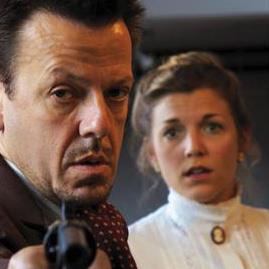by Anton Chekhov
directed by Daniella Fauteux Jacques
presented by Apollinaire Theatre Company
Chelsea Theatre Works
189 Winnisimmet Street
Chelsea, MA
October 10th – November 4th
Apollinaire Theatre Company Facebook Page
Review by Craig Idlebrook
(Chelsea) I believe I once read that the sitcom Seinfeld didn’t last more than a season in Russia. Now I know why. Russia already had its Seinfeld; his name was Anton Chekhov, who writes brilliantly about all light and no heat. If you would like to chuckle and grimace about the painful foibles and imagined slights of the human condition, then you should catch the Apollinaire Theatre Company’s imaginative and spirited production of Chekhov’s Uncle Vanya. But be warned, their lives might look painfully similar to your most dysfunctional family Thanksgivings.
The play picks up on the theme later espoused in the rock classic “Jack and Diane”, when John (then-Cougar) Mellencamp hauntingly hints, “Life goes on/Long after the thrill of living is gone”. But unlike the rocker’s reaction of benign nostalgia in the song, this nominally landed family in pre-Revolution Russia thrashes about in a vain attempt to find the thrill again, resorting to drink, pomposity, illicit romance and, eventually, violence. If you’ve read any Chekhov, I won’t be spoiling it to tell you that nothing works.
If this sounds like a drag, it’s not, at least not with this production. By staging the play intimately in different rooms of the Chelsea Theatre Works theater and having a bashful and somewhat cheerful guitar player lead the audience to their new seats between acts, director Daniella Fauteux Jacques gives theatergoers a much-needed break to take a deep breath and giggle. Unlike many productions of Chekhov
which make me want to jump out of a window, the feeling created here is more akin to sharing a nourishing bowl of soup with friends on a miserably rainy day.
The actors deserve much of the credit for this, particularly the male leads of Ronald Lacey (Astrov) and Diego Arciniegas (Vanya). The pair creates a world- weary camaraderie between their characters that is as similar and as likeable as that between the characters of Hawkeye and Trapper John in Robert Altman’s
movie version of M.A.S.H. In the beginnings of middle age, Astrov and Vanya know the world is absurd and they no longer have the promise of youth to hope it will get better. Arciniegas delivers an electrifying performance as an emasculated soul, infusing Vanya with a light and off-handed despair, delivering lines as afterthoughts like Robert Downey Jr. on good drugs. And when despair fully grips Vanya, Arciniegas seems to be wracked by spasms that are as funny as Kramer storming into Seinfeld’s apartment and as scary as shock treatment. Lacey wisely takes another direction, giving a languid elasticity to Astrov that shows that while the character talks surrender, he hasn’t given up hope yet.
Erin Eva Butcher also keeps the crowd in the game with the love-sick Sonya, who appears the most likely to crumble first, but who in the end provides a strength that can only come from hard-won faith. Butcher keeps Sonya veered toward optimism despite her pain, without having her slip into Pollyanna caricature.
Despite the production’s excellent pacing, the play can feel overly ponderous, much like a New Yorker piece you know you really should read, but won’t. A master of observance, Chekhov isn’t perfect. His peasants, especially, are ill-drawn godly and goodly creatures that show up in so many plays geared toward the upper class. Ann Carpenter (Nanny) does an excellent job bringing a three- dimensional simplicity to her matronly servant of a character, but the similarity between Nanny and the “Mami” caricatures of pre-WWII Hollywood movies is still unmistakable. The playwright also is guilty of repeating himself too often when he wants to underline a point, especially in the overly-long final act.
But I have never seen a production that so minimizes Chekhov’s weaknesses and so accentuates his strengths. It is a circus of the absurd that the Apollinaire Theatre has staged; come if you want to laugh through your tears and learn something about your own stupidity.

